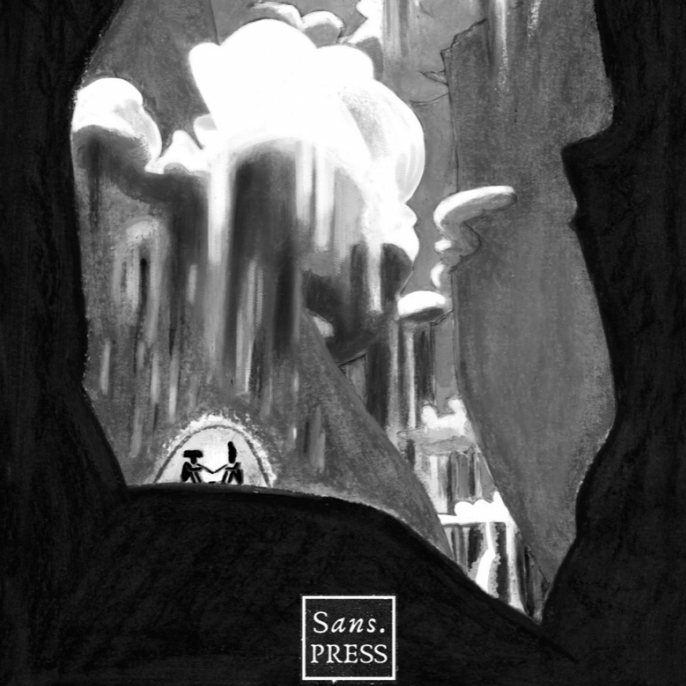
I received a copy of The Last Five Minutes of a Storm from Sans Press through the LibraryThing Early Reviewers program in exchange for an honest review.Have you noticed that when the writing is really smooth, it is easier to take a step back and examine how the development and structure function in a story? That is how I felt when I turned the last page of The Last Five Minutes of a Storm, a short fiction anthology edited by Sam Agar, Paula Dias Garcia, and Marc Clohessy. And to be honest, I don’t have an anthology in my library that is more tightly interconnected than this one.
As you might recall, a short story anthology is a selection of stories written by different authors and curated and arranged by an editor, as opposed to a collection which is a selection of stories written by a single author, usually curated and arranged by the writer themself. To choose the stories for an anthology, the editor has a few methods available to them: they can select from previously published works (a la The Best American Short Stories yearly anthology), commission pieces from particular writers (think Fresh Ink edited by Lamar Giles), or they will put out a public call for submissions and writers will submit their work. The stories from The Last Five Minutes are the product of the latter, which is arguably the more challenging method because even with a strong theme, it is difficult to bring work from several authors together into a unified book.
The reason I think this book is so cohesive is that the editors have treated it as a short story writer treats a short story. They had a vision for the finished book that they articulated into a very specific theme and tone for potential contributors (where most submission-based compilations like literary magazines and anthologies are based on theme alone).
The theme of The Last Five Minutes is not just “storms”, but “how do you see the storms gathering in [sic] the horizon and have the certainty that you can make it through once again?” So, the stories they selected were about storms, both literal and figurative, built on an undercurrent of power, hope, and perseverance.
To help contributors interpret the tone, the editors recommended reading the poetry of Wallace Stevens and observing his ability to “look upon the world with understanding, to see what is there and accept it.” Of this point, I will admit I was leery. Poetry-inspired prose? Not that I don’t like poetry, in fact, I would place short stories closer to poetry than to novels on the literary spectrum, it’s just that I prefer my poetry separate from my prose. But it quickly became evident that tone embodied in Steven’s poetry was exactly what was needed to draw together a cohesive body of work.
The first story of The Last Five Minutes of a Storm establishes the theme and the threads of tone that each subsequent piece carries and contributes to. I read the first seven stories in a single day, which surprised me. Usually, for the reasons outlined above, anthologies, and even collections, are a bit of a bumpy ride to attempt reading straight through and are better taken story by story, with time in between. But it isn’t just the disparate plotlines or tones of the stories that can take their toll on my attention. Often, between the halfway and two-thirds mark of any book, I am more easily distracted. The editors anticipated the temptation of more passive entertainment at just the right moment and sprinkled in a few flash-length pieces and a poem. These served as a bit of a palate cleanser that brought my full attention back for the last two full-length stories.
I don’t like to give rave reviews, but the result of the careful consideration by the editors was a well-paced, immersive world that I emerged from two days later, satisfied and if I’m honest, curious about Wallace Stevens’ poetry. This book is a 4/5 and a strong contender for 5/5 as it stands the test of time (check out my rating criteria). Here is my individual rating and run-on sentence review for each story:
- “A November Storm” by Chris Bogle: Harry, a 73-year-old retired metal worker, thinks about death often but does things he doesn’t enjoy to avoid it. Every page I turned I hoped Bogle wouldn’t end it there. (5/5)
- “Tin Can Elegy” by Tessa Swackhammer: Kid wishes to be the biggest, to have a name, and to have someone to call it, but what she has is a makeshift scimitar. I like a story that turns a little grim. (4/5)
- “Tongues/Lips/Wrists/Teeth” by Kasandra Ferguson: Eileen needs more and more alcohol to numb the change that will overtake her anyway. If you liked Mrs. Fox by Sarah Hall, you will like this story. (3.5/5)
- “Overspill” by Aoife Esmonde: A new mother must balance her baby’s incessant need to feed with her own. I like the twists and turns of the plot in this story. (4/5)
- “Tim, the Lantern Holder” by Sandy Parsons: Tim must decide if adulation is worth the price of his dreams. If he can remember them, that is. I like the way this flash piece seamlessly crosses over from real to fantastic. (4/5)
- “A Man is Fishing on the Bank of a River” by Samuel Skuse: The man and the fish have an agreement that he will enjoy the fishing, then buy fresh fish on his way home. I like the premise of this story, but the continuity is a little off. (2.5/5)
- “Where the Sun is Always Setting” by Daniel Ray: After seven years, Luis is the last of the original survivors tending the fires. New, younger burners are coming on and he finds himself tending them as well. This is a truly satisfying story. I love how smoothly Ray shifts between dialogue, action and exposition. (4/5)
- “Disloyal Order” by Courtney Smyth: It has always been Emma and Fi. Fi and Emma. Except Emma always comes first. I like the way that the plot embodies the coming-of-age story. (3.5/5)
- “Of Elwood and Stones and Gilded Bones” by Mei Davis: Living with the exiled on the outskirts of the village, you work and rise through the ranks as you have again and again. A compelling rescue mission that could take place in the past or the future. It was a bit long. (3.5/5)
- “Care Instructions for Your Cryogenically Frozen Mother” by Helena Pantsis: Instead of death, your mother chooses to be frozen in time, but can you keep her alive? I enjoyed Pantsis’ take on the parent-child relationship. I think flash pieces are better for anthologies than novellas! (3/5)
- “The Last Airport in America” by Holden Wertheimer-Meier: You are in the midst of nuclear war but running for safety (they promised). I liked the premise of this one, and how he resolved it. 3.5/5)
- “Margins of Snow” by Brigitte de Valk: Jaqueline’s mother dies suspiciously and while she awaits each step of the investigation, she roils in grief. My personal preference has never been for poetic short stories, but this line: “Nocturnality had infected her. The morning was a thought that she knew existed, deep inside her, but had not witnessed in such a while.” There are many more like it. (3/5)
- (Poem) “Outrunning the Bear” by Liz Ulin: A woman describes being stalked by a bear. This poem isn’t too far outside of prose, so it fits and is well placed in the collection. I approve. (3.5/5)
- “One Flap of a Storm Crow’s Wings” by Jamie Perrault: Algar the traveller shelters his baby and a lost little boy from a raging storm, then as he is bid by his god, helps the boy reconcile to the destruction of his home. Has compelling bones, but it feels a little raw. (2.5/5)
- “Or Just After” by Liza Wieland: Nisha and her boyfriend have just broken up and she needs to make a decision that is all her own, even if it is the wrong one. The kind of coming-of-age moment where you stand by a character struggling to make the choice that’s good for them. (3.5/5)




